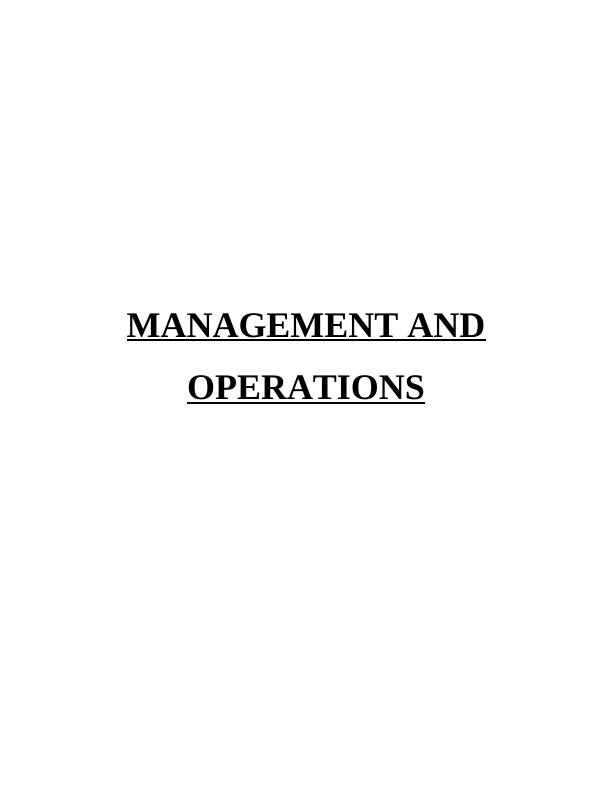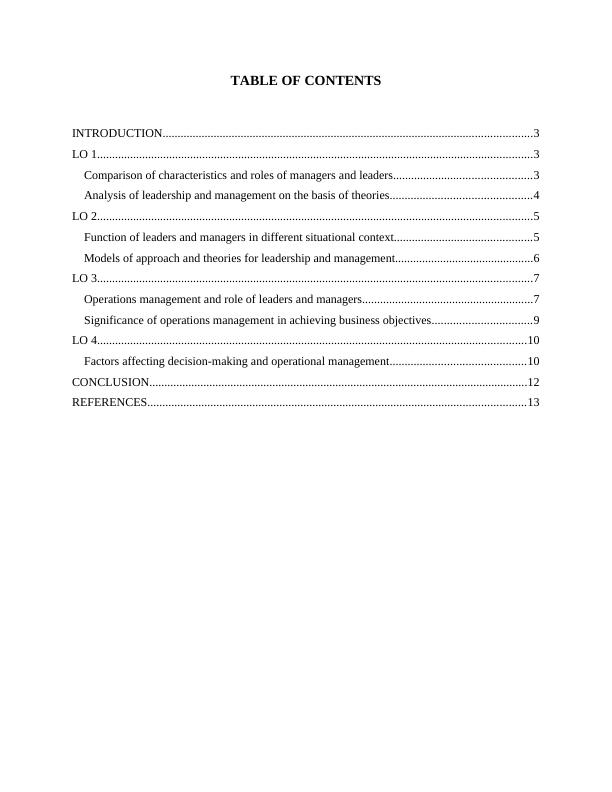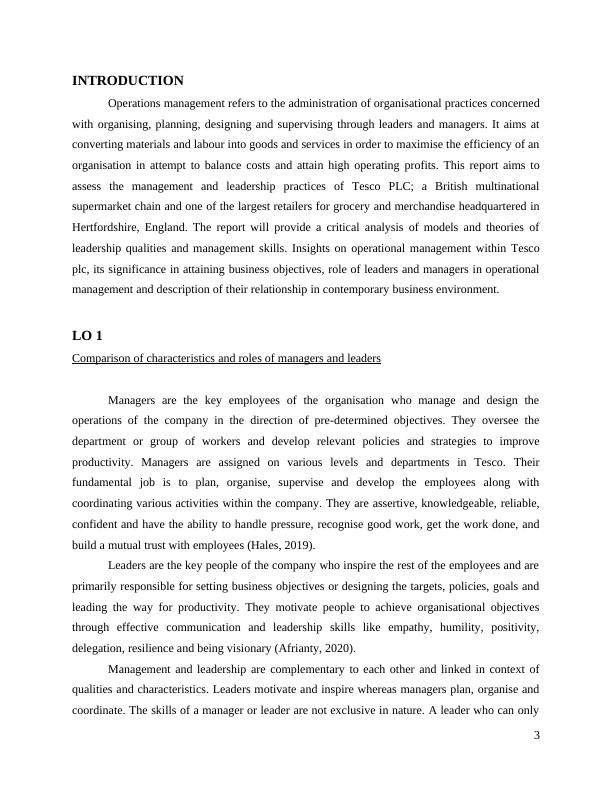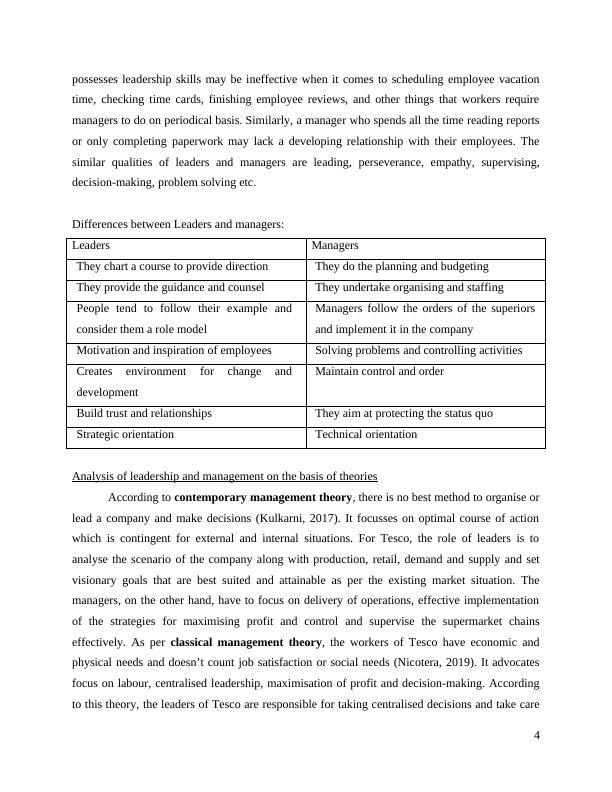Management and Operations
Added on 2023-01-06
14 Pages4661 Words57 Views
MANAGEMENT AND
OPERATIONS
OPERATIONS

TABLE OF CONTENTS
INTRODUCTION...........................................................................................................................3
LO 1.................................................................................................................................................3
Comparison of characteristics and roles of managers and leaders..............................................3
Analysis of leadership and management on the basis of theories...............................................4
LO 2.................................................................................................................................................5
Function of leaders and managers in different situational context..............................................5
Models of approach and theories for leadership and management..............................................6
LO 3.................................................................................................................................................7
Operations management and role of leaders and managers.........................................................7
Significance of operations management in achieving business objectives.................................9
LO 4...............................................................................................................................................10
Factors affecting decision-making and operational management.............................................10
CONCLUSION..............................................................................................................................12
REFERENCES..............................................................................................................................13
INTRODUCTION...........................................................................................................................3
LO 1.................................................................................................................................................3
Comparison of characteristics and roles of managers and leaders..............................................3
Analysis of leadership and management on the basis of theories...............................................4
LO 2.................................................................................................................................................5
Function of leaders and managers in different situational context..............................................5
Models of approach and theories for leadership and management..............................................6
LO 3.................................................................................................................................................7
Operations management and role of leaders and managers.........................................................7
Significance of operations management in achieving business objectives.................................9
LO 4...............................................................................................................................................10
Factors affecting decision-making and operational management.............................................10
CONCLUSION..............................................................................................................................12
REFERENCES..............................................................................................................................13

INTRODUCTION
Operations management refers to the administration of organisational practices concerned
with organising, planning, designing and supervising through leaders and managers. It aims at
converting materials and labour into goods and services in order to maximise the efficiency of an
organisation in attempt to balance costs and attain high operating profits. This report aims to
assess the management and leadership practices of Tesco PLC; a British multinational
supermarket chain and one of the largest retailers for grocery and merchandise headquartered in
Hertfordshire, England. The report will provide a critical analysis of models and theories of
leadership qualities and management skills. Insights on operational management within Tesco
plc, its significance in attaining business objectives, role of leaders and managers in operational
management and description of their relationship in contemporary business environment.
LO 1
Comparison of characteristics and roles of managers and leaders
Managers are the key employees of the organisation who manage and design the
operations of the company in the direction of pre-determined objectives. They oversee the
department or group of workers and develop relevant policies and strategies to improve
productivity. Managers are assigned on various levels and departments in Tesco. Their
fundamental job is to plan, organise, supervise and develop the employees along with
coordinating various activities within the company. They are assertive, knowledgeable, reliable,
confident and have the ability to handle pressure, recognise good work, get the work done, and
build a mutual trust with employees (Hales, 2019).
Leaders are the key people of the company who inspire the rest of the employees and are
primarily responsible for setting business objectives or designing the targets, policies, goals and
leading the way for productivity. They motivate people to achieve organisational objectives
through effective communication and leadership skills like empathy, humility, positivity,
delegation, resilience and being visionary (Afrianty, 2020).
Management and leadership are complementary to each other and linked in context of
qualities and characteristics. Leaders motivate and inspire whereas managers plan, organise and
coordinate. The skills of a manager or leader are not exclusive in nature. A leader who can only
3
Operations management refers to the administration of organisational practices concerned
with organising, planning, designing and supervising through leaders and managers. It aims at
converting materials and labour into goods and services in order to maximise the efficiency of an
organisation in attempt to balance costs and attain high operating profits. This report aims to
assess the management and leadership practices of Tesco PLC; a British multinational
supermarket chain and one of the largest retailers for grocery and merchandise headquartered in
Hertfordshire, England. The report will provide a critical analysis of models and theories of
leadership qualities and management skills. Insights on operational management within Tesco
plc, its significance in attaining business objectives, role of leaders and managers in operational
management and description of their relationship in contemporary business environment.
LO 1
Comparison of characteristics and roles of managers and leaders
Managers are the key employees of the organisation who manage and design the
operations of the company in the direction of pre-determined objectives. They oversee the
department or group of workers and develop relevant policies and strategies to improve
productivity. Managers are assigned on various levels and departments in Tesco. Their
fundamental job is to plan, organise, supervise and develop the employees along with
coordinating various activities within the company. They are assertive, knowledgeable, reliable,
confident and have the ability to handle pressure, recognise good work, get the work done, and
build a mutual trust with employees (Hales, 2019).
Leaders are the key people of the company who inspire the rest of the employees and are
primarily responsible for setting business objectives or designing the targets, policies, goals and
leading the way for productivity. They motivate people to achieve organisational objectives
through effective communication and leadership skills like empathy, humility, positivity,
delegation, resilience and being visionary (Afrianty, 2020).
Management and leadership are complementary to each other and linked in context of
qualities and characteristics. Leaders motivate and inspire whereas managers plan, organise and
coordinate. The skills of a manager or leader are not exclusive in nature. A leader who can only
3

possesses leadership skills may be ineffective when it comes to scheduling employee vacation
time, checking time cards, finishing employee reviews, and other things that workers require
managers to do on periodical basis. Similarly, a manager who spends all the time reading reports
or only completing paperwork may lack a developing relationship with their employees. The
similar qualities of leaders and managers are leading, perseverance, empathy, supervising,
decision-making, problem solving etc.
Differences between Leaders and managers:
Leaders Managers
They chart a course to provide direction They do the planning and budgeting
They provide the guidance and counsel They undertake organising and staffing
People tend to follow their example and
consider them a role model
Managers follow the orders of the superiors
and implement it in the company
Motivation and inspiration of employees Solving problems and controlling activities
Creates environment for change and
development
Maintain control and order
Build trust and relationships They aim at protecting the status quo
Strategic orientation Technical orientation
Analysis of leadership and management on the basis of theories
According to contemporary management theory, there is no best method to organise or
lead a company and make decisions (Kulkarni, 2017). It focusses on optimal course of action
which is contingent for external and internal situations. For Tesco, the role of leaders is to
analyse the scenario of the company along with production, retail, demand and supply and set
visionary goals that are best suited and attainable as per the existing market situation. The
managers, on the other hand, have to focus on delivery of operations, effective implementation
of the strategies for maximising profit and control and supervise the supermarket chains
effectively. As per classical management theory, the workers of Tesco have economic and
physical needs and doesn’t count job satisfaction or social needs (Nicotera, 2019). It advocates
focus on labour, centralised leadership, maximisation of profit and decision-making. According
to this theory, the leaders of Tesco are responsible for taking centralised decisions and take care
4
time, checking time cards, finishing employee reviews, and other things that workers require
managers to do on periodical basis. Similarly, a manager who spends all the time reading reports
or only completing paperwork may lack a developing relationship with their employees. The
similar qualities of leaders and managers are leading, perseverance, empathy, supervising,
decision-making, problem solving etc.
Differences between Leaders and managers:
Leaders Managers
They chart a course to provide direction They do the planning and budgeting
They provide the guidance and counsel They undertake organising and staffing
People tend to follow their example and
consider them a role model
Managers follow the orders of the superiors
and implement it in the company
Motivation and inspiration of employees Solving problems and controlling activities
Creates environment for change and
development
Maintain control and order
Build trust and relationships They aim at protecting the status quo
Strategic orientation Technical orientation
Analysis of leadership and management on the basis of theories
According to contemporary management theory, there is no best method to organise or
lead a company and make decisions (Kulkarni, 2017). It focusses on optimal course of action
which is contingent for external and internal situations. For Tesco, the role of leaders is to
analyse the scenario of the company along with production, retail, demand and supply and set
visionary goals that are best suited and attainable as per the existing market situation. The
managers, on the other hand, have to focus on delivery of operations, effective implementation
of the strategies for maximising profit and control and supervise the supermarket chains
effectively. As per classical management theory, the workers of Tesco have economic and
physical needs and doesn’t count job satisfaction or social needs (Nicotera, 2019). It advocates
focus on labour, centralised leadership, maximisation of profit and decision-making. According
to this theory, the leaders of Tesco are responsible for taking centralised decisions and take care
4

End of preview
Want to access all the pages? Upload your documents or become a member.
Related Documents
Management and Operations Assignment | Next plclg...
|12
|3907
|53
Leadership and Management Concepts Assignmentlg...
|15
|6352
|20
Assignment on History of Travel and Tourism Se (Doc)lg...
|13
|3972
|65
Mnagagement and Operationslg...
|17
|5398
|30
Leadership and Management Conceptslg...
|15
|4518
|26
Role of Manager and Leader in Operations Management - Tesco Plclg...
|18
|5597
|75